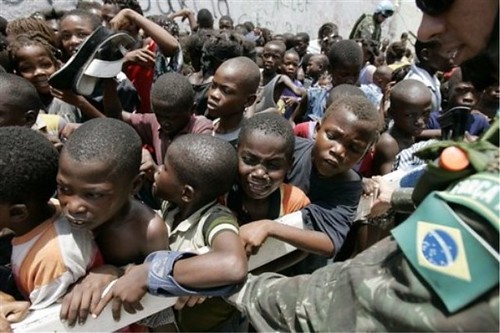 Uploaded on January 13, 2010
Uploaded on January 13, 2010by damopabe
The needs of Haiti's children were vast even before the quake took away what little they had. Nearly half of Haiti's nearly 10 million people are younger than 18. Only half of Haitian children ever attend school, and only 2% finish high school, UNICEF says. Haiti's infant mortality rate and the rate of death for children younger than 5 are the highest in the Western Hemisphere.
Now, "we're in that kind of search and rescue operation ... for these unaccompanied children," says Patrick McCormick, spokesman for UNICEF. "Feed them, give them water, take care of them, protect them, and then start the process of registration and tracing to see if they have any family members left."
Once relief workers have tended to children's physical needs, they will have to help Haitian children face the psychological scars and tremendous upheaval caused by the disaster.
Stability is so important for children, Redlener says, that studies of kids displaced by Katrina show that even five years later, they still struggle in school. Rebuilding efforts often focus too heavily on infrastructure instead of communities and schools, he says. "What really matters is rebuilding the lives and the stability of children. That's what I'm hoping will be the biggest lesson that we can learn from Katrina that we can apply to Haiti."
While Kevin Brito, a relief coordinator for Adventist Development and Relief Agency Spain, tried to distribute energy biscuits at a tent camp this week, three little boys, about 5 years old, tugged at his shirt.
"They were jumping and playful, and they wanted to help with the boxes. They asked, 'Are you my friend?' " says Brito, a psychologist from Madrid. "That touched me. But as I thought about it, I realized how needy they are for affection. They wanted to know someone was caring for them." So Brito gave them small tasks, hugged them and rubbed their heads as they vied for his attention.
The risk of post-traumatic stress is high, specialists say, if children aren't helped. Children have to sort out what they've been through, says Carolyn Miles, chief operating officer of Save the Children. "There's the shock, then there's the 'I just want to hang on to something,' then there's the anger."
As powerful, often conflicting emotions emerge, children need solace and support, says Caryl Stern, head of the U.S. Committee for UNICEF.
"There are kids who are just wandering the streets right now. We need to find them. We need to hug them. We need to give them blankets. We need to tend to their health problems," Stern says. Even in Haiti, which has been racked by hurricanes, floods, riots and mudslides, "for many children, this will be their first major disaster. They don't know that tomorrow may be a better day. They need to be convinced of that."
Jenika Seveur, 10, was playing soccer when the quake struck. She fell down. "I feel bad. I'm not living well. I'm hungry," she says. "We have no place to live. We are living in tents. I don't like it."
If she could make one wish, it would be "for the Americans to help us."



No comments:
Post a Comment